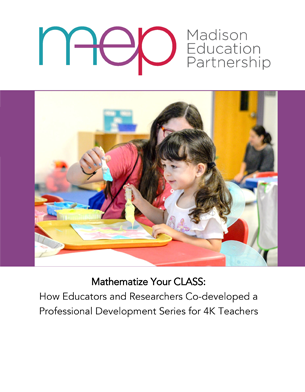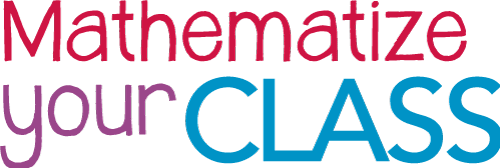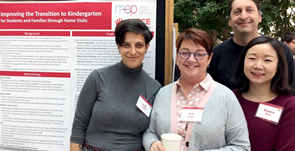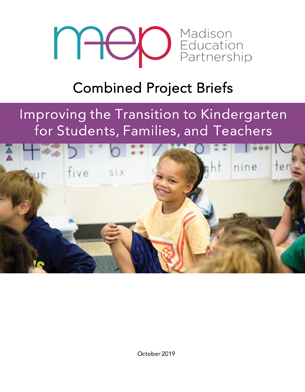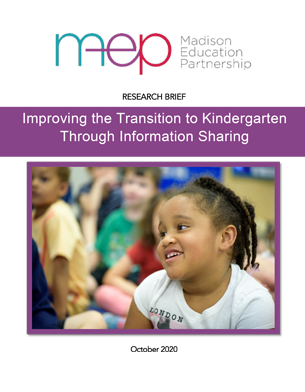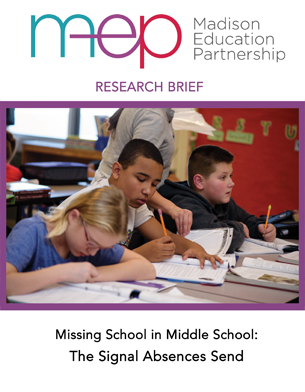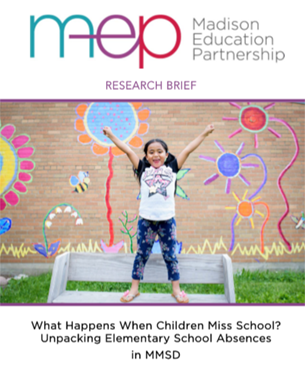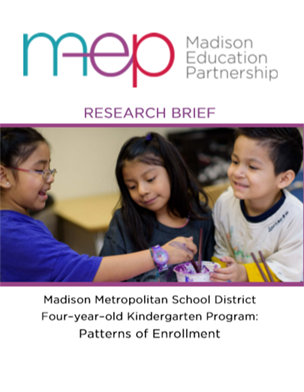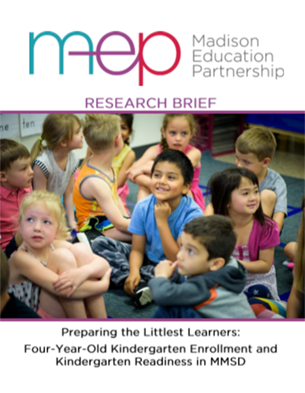CURRENT WORK
MEP both engages in and supports research
The MEP co-Directors (Katie Eklund, Eric Grodsky, Beth Vaade, and Bri Monahan) collaboratively direct research projects with MMSD, as well as support Sponsored Researchers as they undertake complementary, shorter-term research projects.
MEP-Directed research—including the studies listed here—emphasizes issues of interest to MMSD and aligns with national education research trends. The co-directors consult with the MEP Steering Committee to set priorities each year.
The following research projects are ongoing or have been completed.
2023-2024 Research
FD4K evaluation
Research Team: Hailey Love, Eric Grodsky, Rebecca Bier, Kathryn Boonstra, Rosie Miesner, Lauren Lauter, Juliana Correa, Linh Duong
In 2021, MMSD began rolling out a full-day version of its four-year-old kindergarten program (4K) which, until that time, had been offered only in a half-day format. With support from MMSD, the MEP team has undertaken two lines of work aimed at understanding the potential benefits of and challenges to moving to a full-day format. One line of inquiry, led by Rebcca Bier with support from Eric Grodsky, investigates differences in growth in literacy, numeracy, and executive function for students in the full- and half-day sections. Another line of inquiry, led by Hailey Love, seeks to document and describe culturally responsive and inclusive pedagogical practices in 4K classrooms in MMSD school sites.
PSE outcomes
Research Team: Eric Lequesne, Leila Moustafa, Jake Wertz
How clear are students’ postsecondary trajectories by third grade? What can MMSD do to enhance the likelihood that students attend and succeed in college, and what might they do to inadvertently undermine students' postsecondary opportunities? Based on data for several cohorts of MMSD graduates, linked to data on college entry and persistence, we will describe the pathways students follow into and through higher education and the experiences and outcomes in grade 3-12 associated with different postsecondary trajectories. These patterns won’t tell MMSD leaders what to do, but they will help MMSD leaders know where to look for improvements.
Increasing access to mental health services in Madison schools
Research Team: Katie Eklund, Kristen Guetschow, Nelsie Stern, Carrie Klein
Access to behavioral and mental health supports at school often leads to improved academic and behavioral outcomes for K-12 youth. As many more students are demonstrating mental health symptoms than are receiving services, it is critical to determine barriers and facilitators to children receiving school and/or community mental health services. This mixed-methods study uses data from 12 middle schools currently engaging in the REST program in MMSD to evaluate (a) what percentage of students demonstrate elevated risk for mental health concerns?; (b) Of those with elevated risk, what percentage of students receive mental health services at school or in the community?; (c) What are academic and behavioral outcomes for students who received mental health services versus those who did not?; and (d) What are current barriers and facilitators to students’ accessing mental health services? Outcomes will be used to help improve screening, referral, and access to mental health services in Madison schools.
Middle School Math Tutoring
Research Team: Eric Grodsky, Beth Vaade, Patti Schaefer, Laura Whitmore, Lisa Hennessey
MEP is partnering with MMSD’s Secondary Programs and Pathways; Engagement, Diversity Equity, and Inclusion; and Research, Assessment & Improvement (RAI) teams and UW-Madison partners to develop, implement, and evaluate a tutoring intervention focused on middle school math. This project began in the summer of 2023 with a review of existing literature on best practices for high-impact tutoring. In winter 2023-24, the planning team explored options for designing and implementing an evidence-based approach to tutoring in MMSD and initiated a descriptive report on middle school math achievement in MMSD. Through the work of these planning teams, we will pilot a tutoring intervention in Spring 2024 and implement and evaluate that intervention in 2024-25.
2022-2023 Research
FD4K evaluation
Research Team: Hailey Love, Eric Grodsky, Rebecca Bier, Kathryn Boonstra, Rosie Miesner, Lauren Lauter, Juliana Correa, Linh Duong
In 2021, MMSD began rolling out a full-day version of its four-year-old kindergarten program (4K) which, until that time, had been offered only in a half-day format. With support from MMSD, the MEP team has undertaken two lines of work aimed at understanding the potential benefits of and challenges to moving to a full-day format. One line of inquiry, led by Rebcca Bier with support from Eric Grodsky, investigates differences in growth in literacy, numeracy, and executive function for students in the full- and half-day sections. Another line of inquiry, led by Hailey Love, seeks to document and describe culturally responsive and inclusive pedagogical practices in 4K classrooms in MMSD school sites.
PSE outcomes
Research Team: Eric Lequesne, Leila Moustafa, Jake Wertz
How clear are students’ postsecondary trajectories by third grade? What can MMSD do to enhance the likelihood that students attend and succeed in college, and what might they do to inadvertently undermine students' postsecondary opportunities? Based on data for several cohorts of MMSD graduates, linked to data on college entry and persistence, we will describe the pathways students follow into and through higher education and the experiences and outcomes in grade 3-12 associated with different postsecondary trajectories. These patterns won’t tell MMSD leaders what to do, but they will help MMSD leaders know where to look for improvements.
Increasing access to mental health services in Madison schools
Research Team: Katie Eklund, Kristen Guetschow, Nelsie Stern, Carrie Klein
Access to behavioral and mental health supports at school often leads to improved academic and behavioral outcomes for K-12 youth. As many more students are demonstrating mental health symptoms than are receiving services, it is critical to determine barriers and facilitators to children receiving school and/or community mental health services. This mixed-methods study uses data from 12 middle schools currently engaging in the REST program in MMSD to evaluate (a) what percentage of students demonstrate elevated risk for mental health concerns?; (b) Of those with elevated risk, what percentage of students receive mental health services at school or in the community?; (c) What are academic and behavioral outcomes for students who received mental health services versus those who did not?; and (d) What are current barriers and facilitators to students’ accessing mental health services? Outcomes will be used to help improve screening, referral, and access to mental health services in Madison schools.
2021-2022 Research
Full-day 4K Evaluation
MEP is working with MMSD to measure 4K students’ skills at the start and end of the 2021-2022 school year in both full-day and half-day 4K classes. We have selected half-day 4K sections that serve students similar to those in the 16 full-day 4K sections. With a team of UW Madison graduate students, we will assess about 12 randomly selected students in each section on math (Woodcock-Johnson IV Problem Solving) and inhibitory control (the Head, Toes, Knees, Shoulders task) in the fall and spring. We will also analyze the PALS and TS GOLD data teachers routinely collect for their students.
2018 - 2020 Research
School Climate
Research Team: Katie Eklund, Kira Hicks (MMSD), Beth Vaade, and Jake Wertz
MEP’s Steering Committee identified school climate as the key problem of practice for our research to focus on in 2019-2020. Co-Director Katie Eklund is leading one strand of this work, which aims to identify challenges related to school climate with the ninth grade on-track team (9OT). Eklund is collaborating closely with Kira Hicks from MMSD’s Multi-tiered System of Supports/9OT team. Eklund and Hicks have begun meeting with MMSD school-based staff to identify areas to potentially impact policy and practice and to co-develop research questions around school climate.

Student Attendance, Grades 5-9
Research Team: Eric Grodsky, Katie Eklund, Megan Miller (MMSD), Lyn MacGregor, Ruby Bafu, and Jake Wertz
We are continuing our attendance work by interviewing teachers, family members, and community members about chronic absenteeism. We anticipate interviews will last from this winter into spring. Additionally, the research team continues to be involved in the MMSD cross functional team on attendance after its report on middle school absences (PDF).
What makes a Classroom a Community?
Research Team: Eric Grodsky, Patti Schaefer (MMSD), Jake Wertz, Beth Vaade, and Katie Eklund
MEP was awarded a $200,000 grant from the Mindset Scholars Network (MSN) will use survey data from students and teachers, classroom observations, and interviews to determine what teacher mindsets, behaviors, and instructional environments are associated with a stronger sense of belonging and mathematics identity, particularly for black and Latinx students. Grodsky introduced the project at the MSN Fall 2019 Convening in October. The project runs from September 1, 2019 to February 29, 2021.
Enhancing the Quality of Instruction in 4-Year-Old Kindergarten
Research supported by $400,000 grant from the Institute of Education Sciences
Research Team: Katie Eklund, Beth Graue, Eric Grodsky, Katherine Magnuson, Beth Vaade, Culleen Witthuhn, Kathryn Boonstra, Jill Hoiting, and Julianne Snyder
Previous Team members: Leah Awkward-Rich, Amanda Jeppson, Erica Ramberg, and Kaitlyn Young
During this two-year study, researchers are conducting classroom observations to assess the quality of instruction and instructional environments in 4K. The grant runs from Fall 2018 through Summer 2020. In the school year of 2018-2019, we conducted classroom observations and held focus groups, informing the professional development plans. View our products from the project including, poster on the observation design (PDF), progress report (PDF) from May 2019 on classroom observations, and our full report (PDF) on the classroom observations and focus groups is now available. The report helped inform our current professional development series. In summer of 2019, we convened a professional development design team made of teachers and early childhood education directors.
In school year 2019-2020, we are piloting the professional development informed by our previous research and our design team. The series began in October and will continue through the school year. The series, Mathematize my CLASS!, includes 4 Saturday sessions, classroom instructional rotations, and professional learning communities. Interested in the project? Please contact the Project Manager, Amanda Kruger at amkruger2@wisc.edu
Collaborating around the Transition to Kindergarten: Two Studies
Research supported by a $396,000 grant from the Spencer Foundation
Research Team: Beth Graue, Eric Grodsky, Katherine Magnuson, Beth Vaade, Culleen Witthuhn, Caroline Racine-Giles, Nicole Schaefer, Lauren Lauter, and Moonjoo Woo
The transition into five-year-old kindergarten (5K) can be challenging for children, even those who have experience in 4K or other high quality early learning programs.
MEP is conducting three related studies. In the first, researchers are examining school practices to plan for the 4K-5K transition. Document review and interviews will help illuminate how school staff design structures to facilitate smooth transitions, and identify areas where schools can build on current success and address gaps. In the second study, teachers conducted home visits in the summer of 2019. Our research team has interviewed families and teachers who participated in the home visits in addition to teacher focus groups. Lauren Lauter and Moonjoo Woo presented a poster in early 2019 about the design of the study titled, Improving the Transition to Kindergarten for Students and Families through Home Visits (PDF). In November 2019, we released our combined project briefs on three aspects of the study: 1) the examination of the transition practices, 2) feasibility report on the home visits, 3) final report on the home visit experiences from parents, children and teachers.
In fall 2019 to spring 2020, we are working on the final phase of the project, learning what parents, 4K teachers, and 5K teachers want to share and know about incoming 5K students to ease the transition.
POSTER: Improving the Transition to Kindergarten for Students and Families through Home Visits (PDF)
Collaborating around the Transition to Kindergarten: Improving the Transition to Kindergarten through Information Sharing
Research supported by a $396,000 grant from the Spencer Foundation
Research Team: Beth Graue, Eric Grodsky, Beth Vaade, Culleen Witthuhn, Caroline Racine-Giles, Nicole Schaefer, Lauren Lauter, and Moonjoo Woo
The transition into five-year-old kindergarten (5K) can be challenging for children, even those who have experience in 4K or other high quality early learning programs. MEP is conducting three related studies. In the first, researchers are examining school practices to plan for the 4K-5K transition. In the second study, teachers conducted home visits in the summer of 2019. Our research team has interviewed families and teachers who participated in the home visits in addition to teacher focus groups. In November 2019, we released our combined project briefs (PDF) on three aspects of the study: 1) the examination of the transition practices, 2) feasibility report on the home visits, 3) final report on the home visit experiences from parents, children and teachers
In October 2020, we released our information sharing report, encompassing the final phase of the project. Based on the last 18 months of studying 4K-5K transition practices in the Madison Metropolitan School District, this research aims to identify information sharing strategies MMSD teachers currently use as well as institutional barriers that inhibit communication between 4K and 5K teachers.
See full report here: Improving the Transition to Kindergarten through Information Sharing (PDF)
2018 - 2019 Research
Missing School in Middle School: The Signal Absences Send, Grades 5-9
Research Team: Katie Eklund, Jake Wertz, Jaymes Pyne, Eric Grodsky, and Beth Vaade
Researchers, MMSD central office staff, and school leaders worked together to investigate middle school attendance issues. The study showed that unexcused absences may be a sign that students are struggling with behavioral, mental or physical health issues. MEP suggests school administrators can use these signals for early intervention during middle school. Driving questions included:
- How is school climate related to student attendance -- and what is the relationship between school attendance, school climate, and academic achievement?
- To what extent do attendance patterns in grades 6-9 reflect attendance patterns in elementary school? What predicts which students experience increases in attendance, and which students experience declines in attendance, in middle school?
- What is the relationship between behavior metrics (e.g., discipline referrals, suspension/expulsion) and attendance?
2017- 2018 Research
In 2017-2018 MEP remains focused on student outcomes in early grades, transitioning focus to student attendance and chronic absenteeism in grades K-3:
What Happens When Children Miss School? Unpacking Elementary School Absences in MMSD
Research Team: Jaymes Pyne, Eric Grodsky, Elizabeth Vaade, Eric Camburn and Dominique Bradley
MEP researchers investigated student outcomes in early grades, including student attendance and chronic absenteeism in grades K-3. Underpinning this research is the prevailing and compelling logic of focusing on attendance: Students need to be in school to learn; if students do not come to school, teachers, administrators and support staff cannot do their jobs. We present evidence that somewhat contradicts this logic. MEP researchers looked into the following:
- How prevalent are excused and unexcused absences in early elementary school?
- How are student and family background characteristics related to the number and type of absences students’ experience?
- How are excused and unexcused absences in early elementary school related to academic and socioemotional outcomes?
- To what extent do differences in school attendance contribute to racial/ethnic and economic inequalities in academic achievement among children in Grade 3 and younger?
2016-2017 Research Questions
MEP focused on answering important, descriptive questions about the MMSD’s 4K program, including the following:
Madison Metropolitan School District Four-year-old Kindergarten: Patterns of Enrollment
Research Team: Jaymes Pyne, Eric Grodsky, Elizabeth Vaade, Eric Camburn and Dominique Bradley
Although MMSD provides universal access to a part-day 4K-program, opting-in to enroll is not universal. MEP investigated several questions:
- How does enrollment in 4K differ among different groups of children?
- Are students’ background and family characteristics associated with patterns of attendance? For example, are children of color or low-income children more or less likely to attend 4K than other children? Does home language predict attendance?
- Finally, do program elements (such as time of day or type of school) influence enrollment?
MEP research revealed several insights relevant to both policymakers and practitioners interested in improving the quality of 4K—and transitions into 5K—for students and families.
Preparing the Littlest Learners: Four-Your-Old Kindergarten Enrollment and Kindergarten Readiness in MMSD
Research Team: Eric Grodsky, Jaymes Pyne, Elizabeth Vaade, Eric Camburn and Dominique Bradley
This research unpacked participation in 4K and its relationship to school readiness, as well as ways variations associated with child and family attributes. In reality, readiness is a frequently used word, but it includes multiple factors. MEP investigated:
- What is the association between 4K participation and the academic and social and behavioral competencies of children entering Kindergarten?
- How, if at all, does this association vary by race/ethnicity, parental education, or eligibility for free and reduced-price lunch?
- How, if at all, does this association vary across 4K sites?
MEP’s descriptive research and report is useful to those seeking to improve the quality of 4K and facilitate 4K-5K transitions for students and families.

